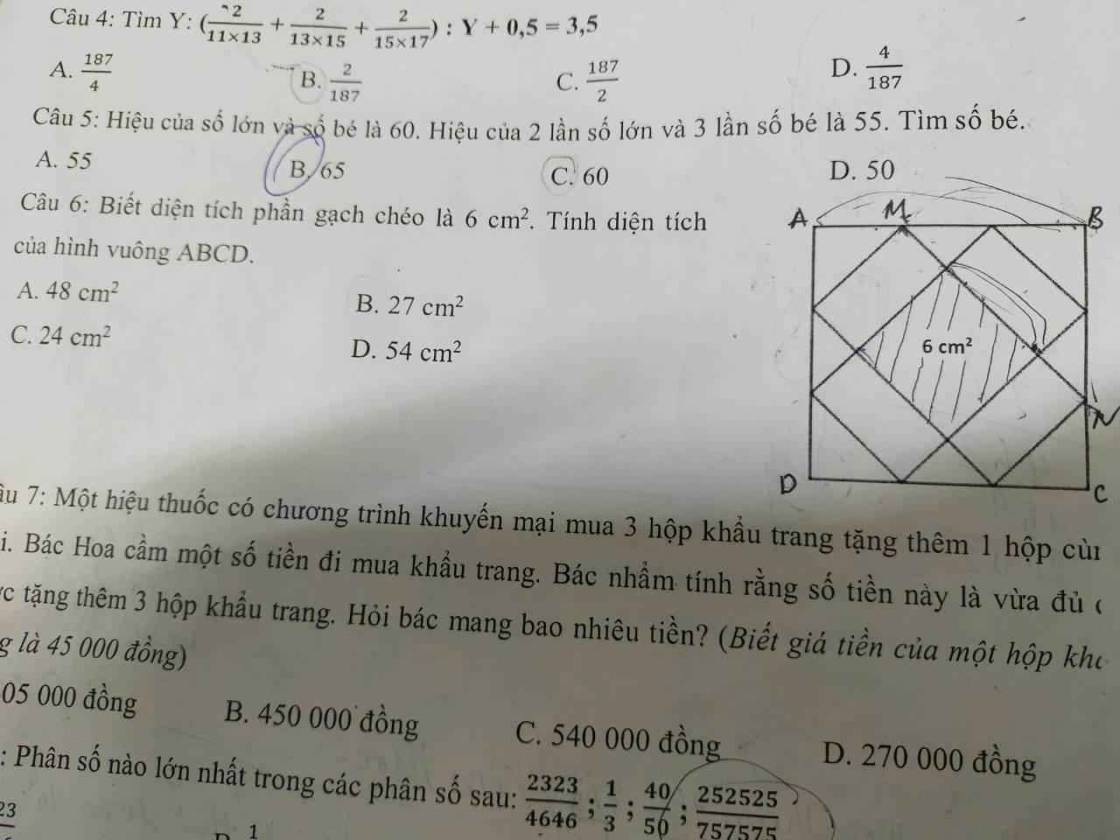Hãy nhập câu hỏi của bạn vào đây, nếu là tài khoản VIP, bạn sẽ được ưu tiên trả lời.

Nhân cả 2 vế với 3 ta có:
\(pt\Leftrightarrow2x-\dfrac{6}{y}=1\Leftrightarrow2x=1+\dfrac{6}{y}\)
Nhận thấy rằng 2x là số nguyên, 1 là số nguyên nên \(\dfrac{6}{y}\) cũng là số nguyên
=> y ∈ Ư(6) = {\(\pm\)1; \(\pm\)2; \(\pm\)3; \(\pm\)6}
Mà 2x là số chẵn => \(1+\dfrac{6}{y}\) là số chẵn => y ∈ {\(\pm\)2; \(\pm\)6}
+) \(y=-6\Rightarrow x=\dfrac{1}{2}\left(1+\dfrac{6}{-6}\right)=0\)
+) \(y=-2\Rightarrow x=\dfrac{1}{2}\left(1+\dfrac{6}{-2}\right)=-1\)
+) \(y=2\Rightarrow x=\dfrac{1}{2}\left(1+\dfrac{6}{2}\right)=2\)
+) \(y=6\Rightarrow x=\dfrac{1}{2}\left(1+\dfrac{6}{6}\right)=1\)

a: =>-2x=90/91
hay x=-45/91
b: =>2x=-7
hay x=-7/2
c: ->-3x=-12
hay x=4

Bài 1:
x/-3=9/4
nên x=-9/4*3=-27/4
2x+y=-4
=>y=-4-2x=-4-2*(-27/4)=-4+27/2=27/2-8/2=19/2

Giải:
a) \(\dfrac{12}{16}=\dfrac{-x}{4}=\dfrac{21}{y}=\dfrac{z}{80}\)
\(\Rightarrow x=\dfrac{12.-4}{16}=-3\)
\(\Rightarrow y=\dfrac{16.21}{12}=28\)
\(\Rightarrow z=\dfrac{12.80}{16}=60\)
b) \(\dfrac{1}{3}x+\dfrac{2}{5}\left(x-1\right)\) =0
\(\dfrac{1}{3}x+\dfrac{2}{5}x-\dfrac{2}{5}=0\)
\(x.\left(\dfrac{1}{3}+\dfrac{2}{5}\right)\) \(=0+\dfrac{2}{5}\)
\(x.\dfrac{11}{15}\) \(=\dfrac{2}{5}\)
x \(=\dfrac{2}{5}:\dfrac{11}{15}\)
x \(=\dfrac{6}{11}\)
c) (2x-3)(6-2x)=0
⇒2x-3=0 hoặc 6-2x=0
x=3/2 hoặc x=3
d) \(\dfrac{-2}{3}-\dfrac{1}{3}\left(2x-5\right)=\dfrac{3}{2}\)
\(\dfrac{1}{3}\left(2x-5\right)=\dfrac{-2}{3}-\dfrac{3}{2}\)
\(\dfrac{1}{3}\left(2x-5\right)=\dfrac{-13}{6}\)
\(2x-5=\dfrac{-13}{6}:\dfrac{1}{3}\)
\(2x-5=\dfrac{-13}{2}\)
\(2x=\dfrac{-13}{2}+5\)
\(2x=\dfrac{-3}{2}\)
\(x=\dfrac{-3}{2}:2\)
\(x=\dfrac{-3}{4}\)
e) \(2\left|\dfrac{1}{2}x-\dfrac{1}{3}\right|=\dfrac{1}{4}\)
\(\left|\dfrac{1}{2}x-\dfrac{1}{3}\right|=\dfrac{1}{4}:2\)
\(\left|\dfrac{1}{2}x-\dfrac{1}{3}\right|=\dfrac{1}{8}\)
\(\Rightarrow\dfrac{1}{2}x-\dfrac{1}{3}=\dfrac{1}{8}\) hoặc \(\dfrac{1}{2}x-\dfrac{1}{3}=\dfrac{-1}{8}\)
\(x=\dfrac{11}{12}\) hoặc \(x=\dfrac{5}{12}\)


a) \(\dfrac{5}{x}=\dfrac{-10}{12}.\Rightarrow x=-6.\)
b) \(\dfrac{4}{-6}=\dfrac{x+3}{9}.\Rightarrow x+3=-6.\Leftrightarrow x=-9.\)
c) \(\dfrac{x-1}{25}=\dfrac{4}{x-1}.\left(đk:x\ne1\right).\Leftrightarrow\dfrac{x-1}{25}-\dfrac{4}{x-1}=0.\)
\(\Leftrightarrow\dfrac{x^2-2x+1-100}{25\left(x-1\right)}=0.\Leftrightarrow x^2-2x-99=0.\)
\(\Leftrightarrow\left[{}\begin{matrix}x=11.\\x=-9.\end{matrix}\right.\) \(\left(TM\right).\)

\(\dfrac{4}{5}x-x-\dfrac{3}{2}x+\dfrac{4}{3}=\dfrac{1}{2}-\dfrac{6}{5}\\ \Rightarrow\left(\dfrac{4}{5}-1-\dfrac{3}{2}\right)x=-\dfrac{7}{10}-\dfrac{4}{3}\\ \Rightarrow-\dfrac{17}{10}x=\dfrac{-61}{30}\\ \Rightarrow x=\dfrac{61}{51}\)
\(\Leftrightarrow x\cdot\dfrac{-17}{10}=\dfrac{1}{2}-\dfrac{6}{5}-\dfrac{4}{3}=\dfrac{-61}{30}\)
hay x=61/51
Lời giải:
$\frac{2x}{3}-\frac{2}{y}=\frac{1}{3}$
$\frac{2xy-6}{3y}=\frac{1}{3}$
$\frac{2xy-6}{3y}=\frac{y}{3y}$
$\Rightarrow 2xy-6=y$
$\Rightarrow y(2x-1)=6$
$y=\frac{6}{2x-1}$
Vì $y$ nguyên nên $\frac{6}{2x-1}$ phải nguyên
$\Rightarrow 2x-1\in Ư(6)$
Mà $2x-1$ lẻ với mọi $x$ nguyên nên $2x-1\in\left\{1;-1;3;-3\right\}$
$\Rightarrow x\in\left\{1; 0; 2; -1\right\}$
Với $x=1$ thì $y=\frac{6}{2x-1}=6$
Với $x=0$ thì $y=\frac{6}{2x-1}=-6$
Với $x=2$ thì $y=\frac{6}{2x-1}=2$
Với $x=-1$ thì $y=\frac{6}{2x-1}=-2$
giúp e bài 6 với ạ. E cám ơn